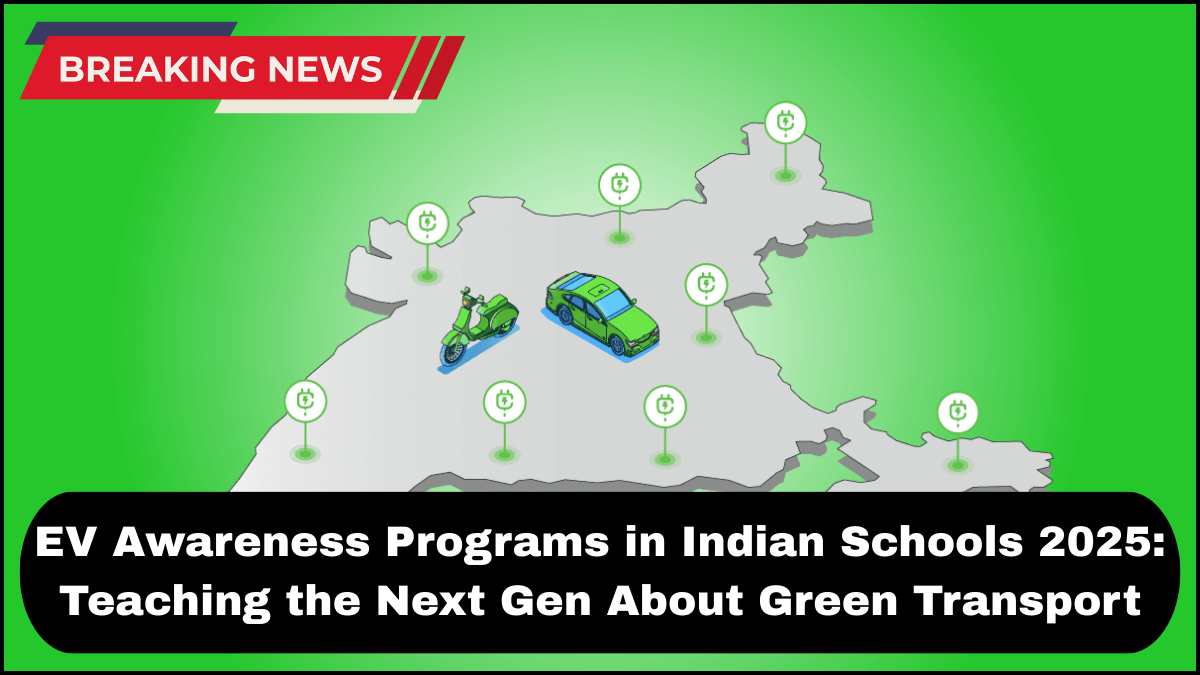India is on a mission to reduce carbon emissions and adopt sustainable mobility solutions. With the rising importance of electric vehicles (EVs), educating the next generation is becoming a national priority. The EV Awareness Campaigns in Schools 2025 are designed to foster electric vehicle literacy among students, equipping them with knowledge, curiosity, and responsibility toward a greener future.

Why EV Awareness in Schools Matters
As India pushes for a major transition to electric mobility, the role of awareness and education becomes critical. Schools, as foundational centers of learning, are the ideal ground to instill eco-conscious values. Teaching students about EVs not only boosts general awareness but also prepares them to be informed consumers, innovators, and policy influencers of tomorrow.
Students today are growing up in a world facing severe climate challenges. Introducing them to the concepts of clean energy, sustainable transport, and green innovation ensures that they develop environmentally responsible habits from an early age.
Key Components of EV Awareness Campaigns in Schools 2025
1. Interactive Workshops and Demonstrations
Schools are partnering with local transport authorities, EV manufacturers, and environmental NGOs to conduct live demonstrations. These include:
- Displaying different types of EVs (two-wheelers, e-rickshaws, buses, etc.)
- Explaining the mechanics behind EVs versus internal combustion engines
- Hands-on activities like assembling EV kits or building simple models
2. Curriculum Integration
In 2025, several educational boards have begun integrating EV-related topics into science, environmental studies, and general knowledge subjects. Topics include:
- Basics of electric propulsion and battery technology
- The impact of fossil fuels vs. electric energy
- Careers in the EV and renewable energy sectors
3. EV Literacy Clubs and Competitions
To make learning fun and continuous, schools are launching EV literacy clubs. These clubs:
- Host debates and quizzes on green transportation
- Run eco-project competitions like “Design Your Dream EV”
- Organize field visits to EV showrooms, charging stations, and manufacturing units
4. Parent and Community Engagement
The success of EV awareness doesn’t stop at students. Schools are extending the message to parents and communities through:
- Green Transport Fairs
- EV Test Drive Days
- Awareness campaigns during annual school events
This creates a ripple effect, where informed students become advocates within their own families and neighborhoods.
5. Government and Industry Support
The Ministry of Education, in collaboration with NITI Aayog and the Ministry of Heavy Industries, is providing grants and resources to promote these campaigns. Industry players like Tata Motors, Ather Energy, and Ola Electric are also playing a key role by sponsoring events, supplying demo vehicles, and offering internships for senior students.
The Broader Impact: A Future-Ready Generation
The EV Awareness Campaigns in Schools 2025 are about more than just knowledge transfer. They’re building a mindset shift. By normalizing discussions around sustainability, clean energy, and green innovation in classrooms, India is grooming future engineers, entrepreneurs, and citizens who are deeply aware of their ecological footprint.
This campaign is also expected to contribute indirectly to EV adoption rates. As students influence purchasing decisions in their households, the demand for electric vehicles is likely to grow organically.
Challenges and the Road Ahead
While the initiative is promising, challenges remain:
- Infrastructure gaps, especially in rural schools
- Limited teacher training on EV topics
- Need for consistent and updated learning materials
Going forward, a structured national framework and regular monitoring will be crucial. Partnerships with ed-tech platforms and increased funding can further bridge these gaps.
Frequently Asked Questions (FAQ)
Q1: Why are EV Awareness Campaigns in Schools important in 2025?
These campaigns ensure that the younger generation understands the value of sustainable transport and becomes proactive in adopting green practices.
Q2: What is electric vehicle literacy among students?
It refers to the understanding of how EVs work, their benefits, and the broader environmental and economic impacts they carry.
Q3: Who supports these awareness campaigns?
Both government agencies and private EV companies support these programs through funding, resources, and active participation.
Q4: Are rural schools included in these campaigns?
Efforts are being made to expand the reach, though infrastructural limitations in some rural areas pose challenges.
Q5: How can parents get involved?
Parents can attend school-organized EV events, encourage their children’s interest in green technology, and consider switching to EVs themselves.
click here to learn more